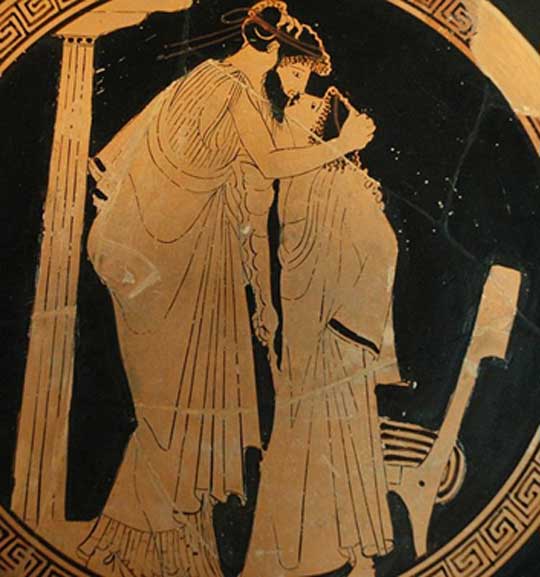How to Win Love and Ruin A Marriage in 5 Easy Steps: ‘Ars Amatoria’ by Ancient Love Guru, Ovid
Before Tinder and Plenty of Fish took over the dating world, men and women used to resort to meeting each other the old-fashioned way—in person, or not at all. Before the internet, dating advice came the old-fashioned way as well—straight out of a book! One of the earliest dating guidebooks comes from the Golden Age of the Roman Empire, from Ovid (Publius Ovidius Naso) himself.
So what did a man of many words, most mythological, have to say about ancient dating?

Roman poet, Publius Ovidius Naso - Ovid. (Public Domain)
Do’s and Don’ts (Mostly Don’ts)
Ovid might have created the stereotypes of the forgetful man and the emotional woman, as his first two books offer men specific advice:
- Don't forget her birthday
- Don't ask her age.
These are two pointers at the top of Ovid's list. It is safe to say that these are rather helpful in the current dating world as well. However, a woman is likely to become far more frustrated with her significant other if they forget her birthday rather than her age...

Erastes (lover) and eromenos (beloved) kissing. Detail from the tondo of a red-figure Attic cup, ca. 480 BC. (Public Domain)
How to Ruin a Marriage by One Who Knows
Ovid elaborates on his dating advice for men, his male "words of wisdom" spanning two books (his female advice is limited to only one). A word of warning, however: Ovid himself was married three times; his first two marriages did not end in death but divorce. One might desire to be a bit wary before utilizing Ovid as a relationship tutor than over others with a better personal track record!
- Shave Your Armpits and Don’t Smell Like a Billy-Goat: Ovid’s Art of Love, Relationships and Adultery
- The Erotic Art of Ancient Greece and Rome
- Sex and the Roman Empire: Scandalous Literature about Empresses Euphemia and Theodora
Some hallmarks of Ovid's male advice are:
- Do not forget her birthday (1.11)
- Write and make promises (1.12)
- Be wherever she is. (1.13)
- Look presentable. (1.14)
- Be gentle and good tempered (2.3)
- Be patient and comply. (2.4)
- Favor her and compliment her. (2.5)
- Comfort her in sickness. (2.6)

Title page of a 1644 edition of Ovid's "Ars Amatoria" (Public Domain)
5 Tips to Jeopardize Love
While these are tidbits of advice are still rather wise, even now, others are best left unread/unsaid to the women of the men Ovid is advising. Such as:
- Promise and deceive (1.16)
- Let her miss you, but not for too long (2.10)
- Have other friends (but be careful) (2.11)
- Stir her jealousy (2.13)
- Keep it secret (2.16)
10-1 bet that these five "tips" injured his own first two marriages more than helped them.

Jealousy and Flirtation, 1874. (Public Domain)
While each individual relationship is different, perhaps there were and/or are a few men who see the wisdom in Ovid's warnings. Regardless, these five tips were—and are—surefire ways to stir up trouble with a lady should she discover the more deceitful underpinnings. Again, Ovid's personal history should therefore be taken into account before a suitor blindly follows the poet's advice.
All the Single Ladies
Let us not forget the women! The ‘fairer sex’ was offered advice from Ovid too. Ovid devotes less time to advising the ladies—whether this is because they needed less help or because men had a larger task on their hands is up for debate. He was not remiss in offering his "sage" wisdom to women, regardless:
- Take care of how you look (3.2); conceal your defects (3.5)
- Make-up (with one's lover), but in private (3.4)
- Be modest in laughter and movement (3.6)
- Learn music, poetry, dancing and games (3.7-8)

The Kiss, 1859. (Public Domain)
Women, evidently, have more surface level advice—Ovid focuses on how they should look and act to attract a man; he might also be responsible in some ways for stereotypes of shallowness. Had he said any of this "advice" aloud to his own spouse, it is likely she would have taken offense. It shall be left to the reader's imagination whether this is another instance in which Ovid soured his own relationships.
- Digitized Zoroastrian Love App! The Preserver or Destroyer of Ancient Ways?
- The Appealing Adonis Who Enthralled Many Ancient Civilizations
- Achieve Your “15 Minutes of Fame” & Ancient Lessons on How to be Famous: Celebrity Culture in the Ancient World
Ovid also provides women with deceitful advice on their own, though these depend on the cleverness and wiles of the women:
- Try young and older lovers. (3.13)
- Use jealousy and fear. (3.14)
- Play cloak and dagger. (3.15)
- Make him believe he is loved (3.16)
A man would be no more pleased with such deceit than a woman would be.
Maybe Stick to Poetry?
Ovid was without question a phenomenal poet and revered among his successors as the supreme writer in whose footsteps one must follow for literary immortality. However, perhaps he would have been better off leaving the romantic advice to the more successful suitors. Scholars do argue that his Ars Amoratia were intended as a satire on current dating practices of Rome in the first century CE; the nature of his own love life leaves the accuracy of this quandary under hot debate.
--
Top Image: Statue of lovers (Public Domain/Deriv)
References
Kenney, Edward John. 2018. “Ovid: Roman Poet.” Britannica Encyclopedia. Accessed April 4, 2018. [Online] Available at: https://www.britannica.com/biography/Ovid-Roman-poet
Ovid. “Ars Amatoria.” ed. Luke Mastin. 2009. Ancient-Literature. Accessed April 5, 2018. [Online] Available at: http://www.ancient-literature.com/rome_ovid_ars.html
Ovid. “Ars Amatoria.” trans. A.S. Kline. 2001. Poetry in Translation. Accessed April 4, 2018. [Online] Available at: https://www.poetryintranslation.com/PITBR/Latin/ArtofLoveBkI.php

















